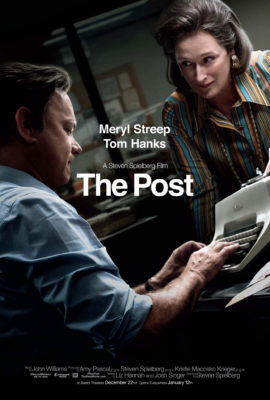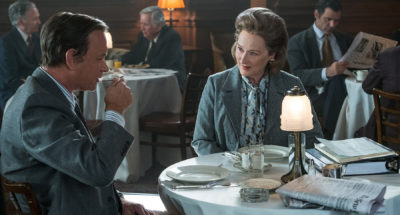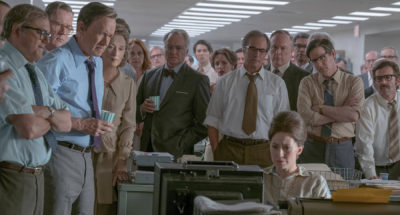Fox Movie Review: The Post
 History was never my strong suit in school, it was never able to capture my attention the same way other subjects did. That's why I'm so grateful for powerful films that not only educate, but shine a spotlight on important events in our history. Particularly when they have an important message to say that is extremely relevant today, like The Post. This Dreamworks/20th Century Fox film has already received numerous accolades and with a limited release in December, it qualifies as a swift competitor at this year's Academy Awards. Now in wide release, it is every American's duty to see this film.
History was never my strong suit in school, it was never able to capture my attention the same way other subjects did. That's why I'm so grateful for powerful films that not only educate, but shine a spotlight on important events in our history. Particularly when they have an important message to say that is extremely relevant today, like The Post. This Dreamworks/20th Century Fox film has already received numerous accolades and with a limited release in December, it qualifies as a swift competitor at this year's Academy Awards. Now in wide release, it is every American's duty to see this film.
Steven Spielberg and Tom Hanks tend to capture lightning every time they collaborate and The Post is no exception. Hanks is always enigmatic, but his portrayal of Ben Bradlee, Executive Editor of The Washington Post, feels removed from his comfort zone and his performance is marvelous. Another Spielberg/Hanks collaboration would be reason enough to see this film, but wait, there's more.
 Receiving top billing is Meryl Streep and surprisingly, this is her first leading role in a Steven Spielberg film (she had a vocal cameo in Artificial Intelligence). As in everything she does, Streep pours herself into her role as Kay Graham, Owner and Publisher of The Washington Post, and her performance is sure to receive yet another Oscar nomination for Best Actress. There's this moment where she makes a tough decision with a phone pressed to her ear that will make you feel everything all at once. That scene alone is so memorable and spectacular that it deserves a standing ovation.
Receiving top billing is Meryl Streep and surprisingly, this is her first leading role in a Steven Spielberg film (she had a vocal cameo in Artificial Intelligence). As in everything she does, Streep pours herself into her role as Kay Graham, Owner and Publisher of The Washington Post, and her performance is sure to receive yet another Oscar nomination for Best Actress. There's this moment where she makes a tough decision with a phone pressed to her ear that will make you feel everything all at once. That scene alone is so memorable and spectacular that it deserves a standing ovation.
The film tells the story of the Pentagon Papers, classified documents about the Vietnam War that were leaked to The New York Times, who was barred by the Nixon Administration from reporting on the story. When more of the papers end up at The Washington Post, which was struggling to stay afloat and in the midst of a risky public offering, Owner/Publisher Kay Graham (Streep) and Executive Editor Ben Bradlee (Hanks) have to make some difficult decisions that could incriminate their entire organization for the benefit of the American people and the world. At best, the world might know the name of their local newspaper. At worst, the paper ceases to exist and they spend the rest of their lives in federal prison.
 Spielberg has a lot to say about modern times through the lens of 1971, the same year Walt Disney World opened. The biggest, most obvious theme is that the free press exists for the benefit of the people, not the benefit of the President, and that restrictions must not be placed on their ability to inform and educate. Even if it makes the Commander in Chief look as bad as... well... Richard Nixon.
Spielberg has a lot to say about modern times through the lens of 1971, the same year Walt Disney World opened. The biggest, most obvious theme is that the free press exists for the benefit of the people, not the benefit of the President, and that restrictions must not be placed on their ability to inform and educate. Even if it makes the Commander in Chief look as bad as... well... Richard Nixon.
There are also feminist and racial undertones that are very apparent if you're looking for them, but may otherwise go unnoticed. Part of the beauty of the film is watching Streep's portrayal of Kay Graham overcome the oppression that she feels everyday as a woman in power in a 1970's man's world. Graham is the only woman in a leadership position in the entire film, the rest are all white men. The only people of color are all in entry level positions and to me, Spielberg shines a light on how much, yet how little, has changed in nearly fifty years.
Spielberg. Streep. Hanks. You don't need me or anyone else to tell you that the merits of this film are worth your time and the price of admission. Go see The Post. That is all.
I give The Post 5 out of 5 overpriced cups of lemonade without vodka.
